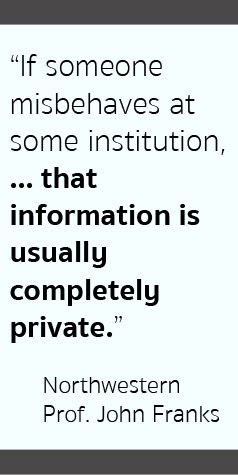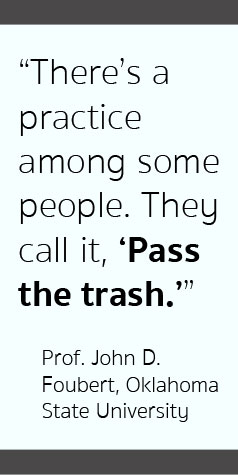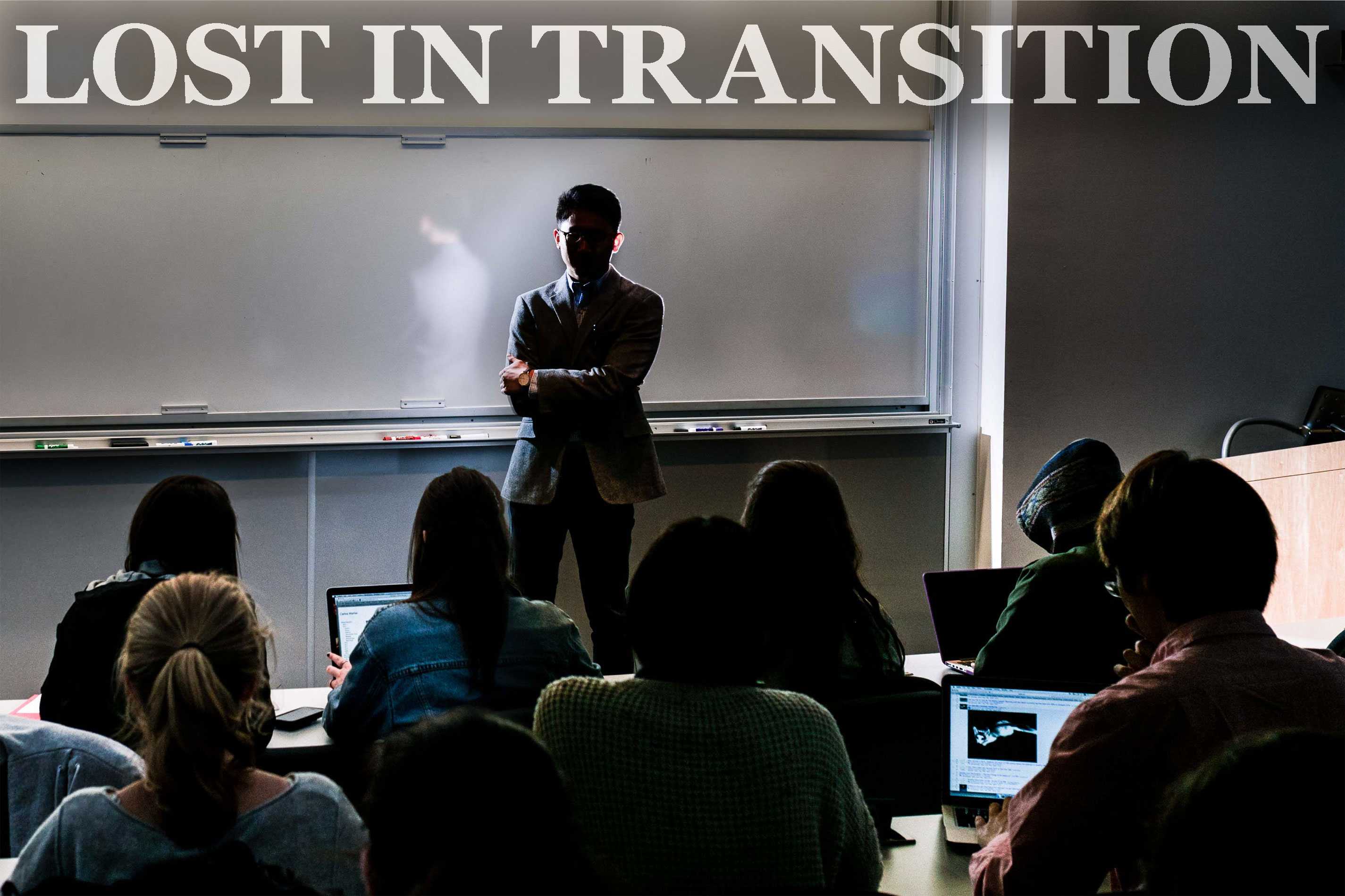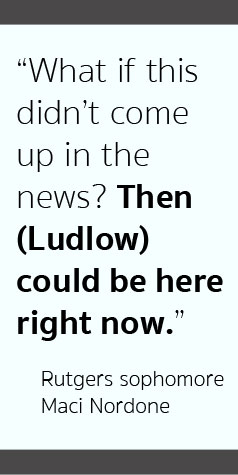Lost in Transition: Northwestern visiting professor’s past raises questions about hiring process
May 5, 2015
An Ohio State University investigator found last year the then-chair of the university’s English department had “created a hostile work environment” that made female administrative staff feel “harassed and intimidated.”
That English professor, Sebastian Knowles, is now a visiting professor at Northwestern for Spring Quarter 2015.
A series of interviews conducted by the investigator with department staff painted Knowles as “volatile” and described violations of Ohio State’s policies on sexual harassment and workplace violence. The investigator found Knowles threatened and intimidated department staff. According to the report, staff said he initiated “inappropriate and unwelcome physical contact” and made “inappropriate comments of a sexual nature” on several occasions.
Knowles refutes these claims and any wrongdoing. In a written rebuttal, he admits to losing his temper and cursing at staff, but attributes this to stress brought on by an illness. He denies making sexual comments, claiming they were taken out of context, and said the staff members themselves initiated inappropriate sexual remarks.
NU said it was unaware of the allegations against Knowles but will review the matter. In interviews, NU administrators said it’s difficult to learn professors’ past disciplinary records in a hiring process complicated by privacy laws and heavily focused on candidates’ academic merit.
 “If someone misbehaves at some institution, there are not good mechanisms for communicating that,” said mathematics Prof. John Franks, the Weinberg senior associate dean for faculty. “That information is usually completely private.”
“If someone misbehaves at some institution, there are not good mechanisms for communicating that,” said mathematics Prof. John Franks, the Weinberg senior associate dean for faculty. “That information is usually completely private.”
The issue extends beyond NU. Administrators and experts who study campus safety say it’s a widespread problem caused by a lack of methods for colleges to vet candidates beyond their resumes, writing samples and reference letters. Schools communicate very little during the hiring process.
“Frankly, some of those people who are causing trouble for the department — department chairs or deans want to get rid of them,” said John D. Foubert, an Oklahoma State University professor of higher education who studies campus sexual assault.
 “There’s a practice among some people,” he said. “They call it, ‘Pass the trash.’”
“There’s a practice among some people,” he said. “They call it, ‘Pass the trash.’”
The Ohio State investigation
During Knowles’ time as department chair, an administrative staff member hesitated when he asked her to increase a co-worker’s salary, according to Ohio State’s investigation report. Knowles slammed his fist on the desk, grabbed a paper from the woman and told her to “shut up and listen.”
Just 10 minutes later, he was back in the woman’s office apologizing, the investigator wrote in the report, which The Daily obtained from Ohio State’s public records office.
“I love you,” the woman recounted Knowles saying. “I love you. I love you. I’m so sorry for yelling at you.”
Knowles put his arm around her and, according to the report, pulled her close and said, “We just need to hug. I’m so sorry.”
The report described Knowles’ interactions with female administrative staff who worked for him during his time as chair. The two women mentioned in the report declined to speak with The Daily for this story, but their interviews for the investigation give a detailed account of Knowles’ misconduct.
The women reported Knowles repeatedly made them upset and uncomfortable. One woman described a pattern of “volatile outbursts,” followed by apologies and gifts, including $300. Staff reported to the investigator “multiple incidents of unwanted physical contact.”
In an official written response to the allegations, Knowles said claims of unwanted touching and comments from one administrative staff member could be “simply rebutted” because she once gave him a hug and made a comment about ejaculation. According to the report, Knowles told the investigator the staff member said the word “self-ejaculation” when it appeared while she was using a spell checker.
One woman said Knowles compared his feelings seeing her stretch to the way he feels when seeing his wife in the bathtub.
Knowles wrote in his rebuttal that this was an attempt to explain he found the situation “awkward” and wanted to avert his gaze.
The investigator found Knowles “repeatedly initiated physical contact, including hugging and kissing, with female staff members,” who reported the behavior to be unwanted “in every instance.” Knowles acknowledged this conduct but denied the behaviors had any “sexual motivation” and told the investigator no bodily fluids were exchanged.
In his findings, the investigator noted Knowles’ response to the claims indicated a failure to understand what behaviors constitute sexual harassment.
Knowles told The Daily he did nothing wrong and declined to comment further on the investigation, deferring to his written rebuttal. He wrote in the rebuttal he was not given a chance to resolve the complaint internally. The university’s guidelines on harassment investigations say a supervisor should decide if the matter can be handled in the department or if Ohio State’s human resources office should investigate. He also complained the investigator failed to take into account “severe mental stress” brought on by personal illness and his mother’s health problems.
Although Knowles told the investigator the two women made sexual comments, the investigator found those claims to be unsubstantiated.
Knowles agreed on Dec. 12, 2013 to take a voluntary leave from his position as chair. He was permitted to continue teaching during the 2014 spring semester because the misconduct concerned his role as department chair, not as a professor, according to the report.
Throughout his career, Knowles has garnered a slew of teaching awards. An Irish literature scholar, he is the president of the International James Joyce Foundation and the editor of a book series on James Joyce.
Ohio State began investigating Knowles’ conduct in mid-December 2013 and issued the final case report in February 2014. The two women mentioned in the investigation moved to work in different departments at the university.
The investigator wrote in his conclusions Ohio State will take “appropriate corrective action” against Knowles based on the policy violations but did not suggest any specific actions. He also noted Knowles would benefit from sexual harassment training.
The investigation file and subsequent interviews with professors in the English department made clear that top officials from Ohio State were familiar with complaints about Knowles’ behavior.
In a March 2014 meeting, administrators asked English department faculty and staff to act professionally toward Knowles and welcome him back, said Ohio State English Prof. Koritha Mitchell. It was a request some in the department found to be a dismissive approach to sexual harassment claims, she said.
Professors at the meeting said administrators told the department the file could be requested from the university’s public records office. Under Ohio’s Public Records Act, anyone can request a record from a public office, including a state university.
Hiring at NU
Knowles will be at NU for Spring Quarter only. He is the Carole and Gordon Segal Visiting Professor of Irish Literature, a position endowed by the alumni couple who co-founded the furniture store Crate & Barrel.
The selection process for the position is less intensive than for a full-time professor and the candidate pool is smaller, limited to those who specialize in Irish literature. NU invites scholars to the position after a department subcommittee nominates candidates, said English and Communication Prof. Susan Manning, a former chair of NU’s English department.
Prof. Laurie Shannon, current chair of the English department, did not respond to requests for comment for this article.
Knowles, who spoke to The Daily about the hiring process but not the investigation, said he was first asked about the position six years ago. He wasn’t available then, but when asked again last year, he submitted a resume with references. The Weinberg dean sent a letter offering him the position about six weeks later, he said.
The typical hiring process for a tenure-track professor, both for the English department and for the rest of the Weinberg College of Arts and Sciences, is more thorough. Candidates submit an application letter, a research statement, a description of their teaching philosophy and letters of recommendation, said Franks, the Weinberg senior associate dean for faculty. Applicants are first reviewed by a hiring committee then by the department. Top candidates visit campus to interview, meet with faculty and may give a lecture on their area of expertise.
After department faculty vote, final hiring decisions are made by the dean of the school and then the provost. Each school at NU has slight variations in the hiring process, but most follow this model, said SESP Prof. Lindsay Chase-Lansdale, associate provost for faculty.
NU administrators said it’s not common practice for the University to ask for personnel files or disciplinary records of candidates. University spokesman Al Cubbage said NU did not know of Knowles’ policy violations at Ohio State before offering him the position.
Depending on the state, parts of a personnel file, including disciplinary records, may be protected by privacy laws. For public institutions, NU could, in some cases, submit a request under a state’s open record laws. But faculty often don’t want their employers to know they are contemplating a move and NU faculty searches are kept confidential, Provost Daniel Linzer said.
Most of Weinberg’s new hires are Ph.D. or postdoctoral students who have not held faculty positions before, Franks said.
But for those coming from other universities, Franks said NU hopes letters reveal any sexual misconduct or disciplinary infractions. The University sometimes solicits additional reference letters from experts in the candidate’s field. He said Weinberg has on some occasions asked for a personnel file for a potential senior hire if they detect “a cause for concern.”
For the English department, Manning also said references are important but department staff also rely on “intuition and judgment” when evaluating a new hire.
“There is a sense of professionalism where we do assume that if someone comes recommended by six of our colleagues in the field,” she said, “we are not assuming we’re hiring people that have a past that is covered up.”
A bigger problem
NU is not the only school to unknowingly hire a professor accused of misconduct.
In May 2014, Loyola University Chicago found itself in a similar situation after it hired Miguel H. Díaz, a former U.S. ambassador to the Vatican who previously taught at the University of Dayton in Ohio.
While Díaz was at Dayton, an investigation conducted by outside counsel found he likely engaged in “unwelcome conduct of a sexual nature” toward a married couple who worked with him at the Catholic university, according to a letter obtained by the website Inside Higher Ed.
The confidential letter from the provost to the married couple acknowledged the couple’s concerns that Díaz had sexually harassed them through “various requests and references to explicitly sexual feelings” even after being told to stop.
Though it was sent in July 2013, the letter was not made public until May 2014, after Díaz had already made plans to leave Dayton for Loyola. After the sexual harassment accusations came to light, Inside Higher Ed reported Loyola reviewed the allegations against Díaz and ultimately decided not to withdraw their offer. He became a professor at Loyola last year.
Controversies surrounding University of Illinois Prof. James Kilgore, a convicted criminal who was involved with a 1975 bank robbery that left one person dead, and Pennsylvania State University’s Jerry Sandusky have sparked conversation of faculty background checks.
After Sandusky, an assistant football coach, was found guilty of sexually abusing young boys — some on Penn State’s campus — the university began conducting background checks on new hires and on volunteers who work with children. Other Big Ten universities, including the University of Michigan and the University of Illinois, followed suit with similar policies.
Linzer said NU does background checks on some hires, but the process is too complicated to replicate for every new hire. Some information that appears in background checks is sensitive, and NU may not want to distribute it to the hiring committee. The University also has to give professors a chance to respond to findings, which can slow the hiring process, Linzer said. It also puts NU in the position of deciding a fair system for what kind of infraction would invalidate a candidate.
“If a potential faculty member was caught smoking marijuana as an undergraduate,” Linzer said, “is that grounds for saying you’re not eligible for a faculty position? … The question is where do you draw the line?”
 Other occupations incorporate background checks into the hiring process. Some states require checks in professions ranging from teachers to school bus drivers to mortgage salesmen.
Other occupations incorporate background checks into the hiring process. Some states require checks in professions ranging from teachers to school bus drivers to mortgage salesmen.
Although background checks can pick up criminal infractions and lawsuits filed against a candidate, violations of university sexual misconduct policies would not surface. That information can usually be provided only by the university or the candidate.
A flaw in the system
For a student trying to transfer to another university or matriculate to a graduate school, it’s much harder to hide a violation of a sexual misconduct policy. Many applications, including The Common Application, ask students to authorize another institution to access their transcript and some student conduct information from a former school.
NU receives several hundred requests for student conduct records from other universities students have applied to transfer to or attend, said Dean of Students Todd Adams.
NU will reveal student conduct issues only if the violation resulted in a suspension, expulsion or exclusion from certain University privileges and activities, Adams said. If a student received one of these disciplinary sanctions, NU will report that to the inquiring university along with the policy the student breached.
Adams said this is a common practice nationwide. In its guidelines for handling allegations of sexual misconduct, the Association for Student Conduct Administration recommends universities indicate suspensions or expulsions on a student’s transcript to ensure any future institution the student attends is aware of any behavioral issues.
But professors typically aren’t subject to this level of scrutiny and don’t have common, transcript-like documents they are required to show when applying for new teaching positions.
A personnel record is the common thread among all professors who transfer from one university to another. State laws vary in how much information from these files universities or other agencies can disclose. In some states, these disciplinary records are completely confidential and protected even from open records law requests. The Illinois Personnel Record Review Act, however, has a provision that allows employers to disclose to a third party a “disciplinary report, letter of reprimand, or other disciplinary action” that is less than four years old if they notify the employee.
Cubbage said the University is aware of the law but, as a matter of practice, does not disclose any information about employees except the dates of employment and the position held.
“We would never share a faculty member’s personnel file with another institution unless required to do so by a court,” Franks said.
It’s not a practice unique to NU. Schools do not typically communicate with one another during the hiring process or ask for disciplinary records. However, even if the practice were common, experts in campus safety and employment law say there are multiple deterrents to disclosure.
Schools may choose not to reveal misconduct findings to a third party because it could open them up to lawsuits from professors who want to challenge the validity of a school’s investigation processes, said Aaron Maduff, a Chicago employment lawyer. A university could spend months tied up in costly litigation.
Disclosing records makes it hard for a university to keep the results discreet, said Esther Seitz, an Illinois lawyer knowledgeable in public records law. If a private university sends employee disciplinary files to a state school, those records then become part of that school’s file and can be requested by anyone under state open record laws.
Then there are schools that have a problematic professor with tenure. Telling another institution about faculty members’ misconduct could mean they won’t leave their current post, said Foubert, the Oklahoma State higher education professor.
But in states with strong open record laws, there is often nothing legally stopping a university from checking a professor’s past disciplinary record. And none of the reasons to keep sexual misconduct findings secret are more important than protecting students, said sociology Prof. Laura Beth Nielsen, NU’s director of legal studies.
“We could take a more assertive role in vetting incoming professors by asking for these records in states where we’re allowed,” she said. “So then why aren’t we doing that?”
The Ludlow case
In spring 2012, NU’s Title IX Coordinator Joan Slavin sent former Weinberg dean Sarah Mangelsdorf the results of her investigation on philosophy Prof. Peter Ludlow.
“Ludlow repeatedly refused to answer whether he has had any sexual, dating, or romantic relationships with Northwestern undergraduate or graduate students,” Slavin wrote. “I am concerned that Ludlow may have a pattern of using his position as a faculty member to engage in sexual or romantic relationships with young female students.”
In the investigation, Slavin substantiated many of the claims made by a Medill senior who said Ludlow sexually assaulted her after a February 2012 art show the two attended together in downtown Chicago.
Through his lawyer, Ludlow has denied the student’s claims and sued NU for defamation. The suit was later dismissed.
More than 19 months after Slavin’s investigation, Ludlow alluded to a job change on Facebook by linking to a post on a philosophy blog that announced he would move to Rutgers, The State University of New Jersey. According to the blog, he was hired as director of Rutgers’ Center for Cognitive Science, where he had been a visiting professor in fall 2012.
The move seemed certain. The blog’s writer, University of Chicago Prof. Brian Leiter, told The Daily in February 2014 he had learned the information from both Rutgers and Ludlow.
Slavin had asked the student to keep confidential the limited findings she had shared with her from her investigation on Ludlow. NU’s investigation didn’t become public knowledge until February 2014 when, frustrated with the University’s handling of her reported sexual assault, the student filed a Title IX lawsuit against the school.
What had been hidden in personnel files and confidential emails could now be easily accessed online.
The day after news broke of Ludlow’s alleged sexual misconduct, Rutgers balked. At the time, spokesman Greg Trevor told The Daily that Rutgers was not aware of the allegations in the lawsuit and would not confirm the school had offered Ludlow a position or that he had accepted.
In July 2014, Rutgers announced Ludlow would not join its faculty and pushed blame toward Ludlow for not being forthcoming with details of alleged misconduct at NU.
“When Rutgers learned of allegations against Professor Ludlow at Northwestern, the university requested relevant information from Professor Ludlow and his attorney,” the spokesman wrote in a statement. “This information was not provided. As a result, Professor Ludlow will not be coming to Rutgers University.”
Ludlow’s attorney Kristin Case said the requested information could not be provided because of confidentiality issues. NU declined to comment, citing pending litigation.
Mobilizing under the campus group Women Organizing Against Harassment, Rutgers students protested Ludlow’s candidacy and petitioned their university to vet candidates for sexual misconduct. The university’s near hiring of Ludlow left some students feeling shaken, said Maci Nordone, a member of WOAH.
“We still don’t really know how to prevent something like this from happening in the future,” said Nordone, a Rutgers sophomore. “What if this didn’t come up in the news? Then he could be here right now.”
Worried about Ludlow’s plans to move to Rutgers, a group of about 20 concerned NU professors wrote a petition in February 2014 to the Board of Trustees asking them to make sure “professors who have been determined (by campus or legal processes) to have committed sexual harassment, violence, or abuse shall not be ‘passed on’ to other Universities.”
With the hiring process centered on a candidate’s academic record, experts say it’s easy for disciplinary infractions to go unnoticed. Rutgers was unaware of the allegations against Ludlow just as NU was unaware of Knowles’ misconduct at Ohio State.
“Might we be vulnerable to hiring someone who committed academic fraud? Plagiarism? It could be anything — I have no idea,” University President Morton Schapiro told The Daily in March. “It’s a fair question.”
Photo illustration by Jackie Marthouse and Sean Su/Daily Senior Staffers
Email: [email protected]
Twitter: @allymutnick


